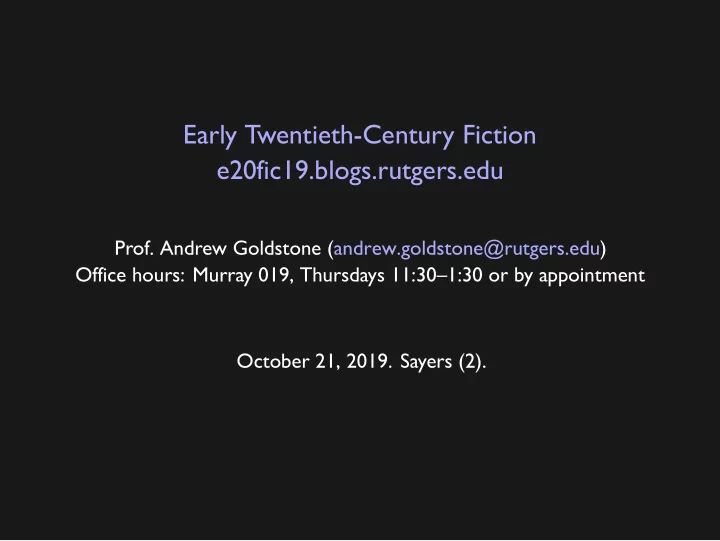

Early Twentieth-Century Fiction e20fic19.blogs.rutgers.edu Prof. Andrew Goldstone (andrew.goldstone@rutgers.edu) Office hours: Murray 019, Thursdays 11:30–1:30 or by appointment October 21, 2019. Sayers (2).
review: Sayers and the genre ▶ self-reflexivity ▶ the ratchet mechanism ▶ “But I’ll tell you what, Parker, we’re up against a criminal— the criminal—the real artist and blighter with imagination—real, artistic, finished stuff. I’m enjoyin’ this, Parker.” (20) ▶ literariness and elevation (Sayers’s ambivalence)
Rivers running into the sand—rivers running underground, very far down— Where Alph, the sacred river, ran Through caverns measureless to man Down to a sunless sea. By leaning his head down, it seemed to Lord Peter that he could hear them, very faintly, lipping and gurgling somewhere in the darkness. (89)
clues? “When you have eliminated the impossible, whatever remains, however improbable, must be the truth.” (Conan Doyle, The Sign of the Four [1890])
Though pretensions to systematic knowledge may appear more and more far-fetched, the idea of totality does not necessarily need to be abandoned. On the contrary, the existence of a deeply rooted relationship that ex- plains superficial phenomena is confirmed the very moment it is stated that direct knowledge of such a connection is not possible. Though reality may seem to be opaque, there are privileged zones—signs, clues—which allow us to penetrate it. This idea, which is the crux of the conjectural or semiotic paradigm, has made progress in the most varied cognitive circles and has deeply influ- enced the humane sciences. Carlo Ginzburg, “Clues: Roots of an Evidential Paradigm,” in Clues, Myths, and the Historical Method (Baltimore: JHUP, 2013), 123. (Earlier version in History Workshop 9 [Spring 1980]. JSTOR.)
discussion: method “Following the methods inculcated at that University of which I have the honour to be a member, we will now examine severally the various sug- gestions afforded by Possibility No. 2…” (50–51) ▶ What is Wimsey’s detective method?
What explains why Wimsey’s method is different from Holmes’s “scientific detection”? historical changes COSSSSRI … SCISSORS (91) “It’s impossible,” said his reason, feebly; “ credo quia impossible ,” said his interior certainty with impervious self-satisfaction. (92)
historical changes COSSSSRI … SCISSORS (91) “It’s impossible,” said his reason, feebly; “ credo quia impossible ,” said his interior certainty with impervious self-satisfaction. (92) ▶ What explains why Wimsey’s method is different from Holmes’s “scientific detection”?
historical changes COSSSSRI … SCISSORS (91) “It’s impossible,” said his reason, feebly; “ credo quia impossible ,” said his interior certainty with impervious self-satisfaction. (92) ▶ What explains why Wimsey’s method is different from Holmes’s “scientific detection”? Historically speaking?
modern detection: the war “Listen! Oh, my God! I can’t hear—I can’t hear anything for the noise of the guns. Can’t they stop the guns?” “Oh dear!” said Mr. Bunter to himself. “No, no—it’s all right, Major— don’t you worry.” (93)
discussion: stakes ▶ What is at stake in the solution of the Battersea mystery? Find a clue.
let’s be serious Of this realization of a great city itself as something wild and obvious the detective story is certainly the Iliad…. The romance of the police force is thus the whole romance of man. It is based on the fact that morality is the most dark and daring of con- spiracies. It reminds us that the whole noiseless and unnoticeable police management by which we are ruled and protected is only a successful knight-errantry. G.K. Chesterton, “A Defence of Detective Stories,” in The Defendant (Lon- don: Dent, 1901; HathiTrust), 158, 162.
“No, Bunter, I pay you £200 a year to keep your thoughts to yourself. Tell me, Bunter, in these democratic days, don’t you think that’s unfair?” “No, my lord.” (10–11) contradiction “Why did he call him a Sheeny?” (108) “It isn’t the girl Freke would bother about—it’s having his aristocratic nose put out of joint by a little Jewish nobody.” (113; qtd. by Eug) “But so sad about poor Sir Reuben. I must write a few lines to Lady Levy; I used to know her quite well, you know, dear….Christine Ford, she was then, and I remember so well the dreadful trouble there was about her marrying a Jew….He was very handsome, then, you know, dear, in a foreign-looking way, but he hadn’t any means, and the Fords didn’t like his religion. Of course we’re all Jews nowadays.” (27)
contradiction “Why did he call him a Sheeny?” (108) “It isn’t the girl Freke would bother about—it’s having his aristocratic nose put out of joint by a little Jewish nobody.” (113; qtd. by Eug) “But so sad about poor Sir Reuben. I must write a few lines to Lady Levy; I used to know her quite well, you know, dear….Christine Ford, she was then, and I remember so well the dreadful trouble there was about her marrying a Jew….He was very handsome, then, you know, dear, in a foreign-looking way, but he hadn’t any means, and the Fords didn’t like his religion. Of course we’re all Jews nowadays.” (27) “No, Bunter, I pay you £200 a year to keep your thoughts to yourself. Tell me, Bunter, in these democratic days, don’t you think that’s unfair?” “No, my lord.” (10–11)
next ▶ Hammett, Maltese Falcon , at least through chap. 13
Recommend
More recommend